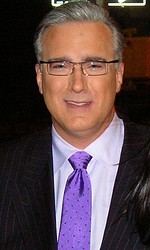After the recent and sudden departure of Keith Olbermann as the host of MSNBC’s daily Countdown, criticism of parent network NBC (as well as Comcast, who recently acquired NBC) has flowed unabated in social media. Regular readers know that I regularly provide advice to companies operating in crises, usually in private to clients, but sometimes publicly on this blog. This time, I thought it would be interesting to talk about an unfolding crisis, which is dangerous, because events can easily overtake my advice, given that I have no idea (just like the rest of us) what is really going on here.

Image via Wikipedia
I also run the risk of being perceived as a Keith fanboy or an NBC apologist, but I am neither. I have no ties to NBC, and while I was a big fan of Keith Olbermann when he was doing sports on ESPN, I have hardly watched him on MSNBC, because I don’t watch much of any of those political shows, most being more heat than light. I do admit chuckling a few times at his over-the-top “Worst Person in the World” segments, but I didn’t watch Countdown enough to have much of an opinion either way.
I am also on the sidelines in America’s perennial red vs. blue liberal-conservative steel cage match. I tend to vote all over the place and make up my mind on individual issues rather than wholesale ideologies, so I don’t have a dog in that hunt, either.
So, what I can talk about is how NBC is handling this event, which is mainly with silence. What we know is that Olbermann abruptly departed, but we don’t know why. We also know that the media (mainstream and social) has been abuzz with rumors that NBC fired Olbermann, from which many have now backtracked. Some are now reporting that Olbermann cut a deal to leave amicably, but that hasn’t dampened the rumor mill. Many of the breathless rumors have tied the departure to the recent approval of Comcast’s acquisition of NBC. NBC, to my knowledge, has not commented even now, days later, on the real story and neither has Olbermann.
So, what can we learn from all of this?
First, the silence has been overwhelmingly interpreted as negative for NBC. Olbermann’s fans assume that he was fired or provoked to resign and NBC’s lack of commentary just fuels that fire. The longer the silence continues, the more people believe the speculation, assuming that if it wasn’t true that NBC would say something. Contrast this departure with how NBC handled Conan O’Brien’s exit, where it was always clear that NBC had pulled the trigger.
Sometimes deals are hatched were two parties settle their differences and agree not to comment about the settlement. I don’t know if that is what happened here, but in the world of social media, that seems to cut badly against the company rather than the individual. NBC knows this, too, from the Conan debacle.
I believe that the days of high-profile pacts of silence are over. It’s fine to agree to a collective “no comment” in a dispute where the media won’t be swarming, but in this case it makes no sense, if that is what happened. NBC should have known better from its experience with Conan.
So, what if Olbermann abruptly resigned with no warning to NBC? Would that get NBC off the hook? Sadly, no. The TV business is star-driven, and Olbermann, whether you loved him or hated him was one of the biggest stars at MSNBC, perhaps the biggest. Media companies must have a plan for how they will cope with one of their stars abruptly leaving. It’s not different than airlines knowing what they will do if they suffer a plane crash—sure, they never know when it is coming but they can still be prepared for the media attention that such a tragic event provokes. Manufacturing companies have plans for handling product recalls. Most crises can’t be predicted in advance (else we’d try to prevent them), but it is very predictable that certain kinds of crises will occur for businesses at some unknown time. We can prepare for them.
TV networks need crisis management plans built around the exits of big stars. MSNBC ought to have a plan around each individual host of their shows. How they would need to handle Rachel Maddow’s abrupt resignation would be very different from how they needed to handle Olbermann’s. There would be different rumors, different groups upset, and that is all part of what they need to think about.
Now there is no way to know whether Olbermann is blameless in this onflict—that’s rarely true in life. Eventually the real story will come out and people will make up their minds. But NBC is continuing to endure unwelcome publicity—even directed against Comcast, which I suspect would not want such publicity given its cable television business that regularly must deal with government regulation.
So, what should you do differently? If your business has risks that it regularly runs that can blow up any minute, you need to have both a PR plan and a social media plan that you can swing into action when it happens. It doesn’t seem like NBC had such a plan other than: Say nothing and it will all blow over. You can try that plan, but I don’t think it makes a lot of sense in this day and age.



